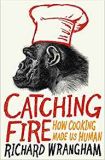Catching Fire: How Cooking Made Us Human by Richard Wrangham
| Catching Fire: How Cooking Made Us Human by Richard Wrangham | |
|
| |
| Category: Popular Science | |
| Reviewer: Magda Healey | |
| Summary: From the diet most appropriate for humans to sexual division of labour, from food labelling to patriarchal society, this fascinating account of the role of cooking in humans' evolutionary development will inform, stimulate and provoke debate. Highly recommended. | |
| Buy? Yes | Borrow? Yes |
| Pages: 320 | Date: September 2009 |
| Publisher: Profile Books | |
| ISBN: 978-1846682858 | |
|
| |
Humans are cooking apes. According to Richard Wrangham, mastery of fire and cooking of the food that resulted from it was at the root of human evolutionary development and ultimate success. Various factors have been proposed as the crucial stimulus which led to the appearance of the first recognisably human creatures: leaving aside divine intervention (be it from God, extra-terrestrials or future humans travelling in time), the candidates for what made our ancestral apes stand straighter and start growing brains range from socialised hunting to chattering about kinship to eating seafood.
Many scientist believe that better nutrition obtained by hunting and eating meat was the key. Richard Wrangham proposes - rather convincingly - that hunting on a large scale wouldn't have been possible without cooking, and that even with plant foods alone, food processing of various kinds (pounding, chopping, pickling), but most of all cooking, provides huge nutritional benefits. Food that is cooked and/or processed in other ways is more digestible, and thus allows the body to extract more energy at a lesser metabolic cost.
Common sense practice and folk knowledge knows it without a doubt: anybody who ever had to feed a baby, elderly or convalescent realises that soft, cooked food is needed to provide maximum nutritional benefit. There is also a wide-spread intuition that processed foods are inherently more fattening. This defies all food labelling practices, but, fascinatingly, is supported by numerous field observations and experiments on animals and humans.
The human digestive system is adapted to cooked food: the gut is shorter, especially the small intestine, the jaws (and the mouth opening in particular) smaller, the teeth relatively weak.
All human communities cook, and the raw food faddist living now in developed western countries process their food with aid of blenders and mashers as well as usually eating at least some proportion of cooked food - which doesn't prevent the fact that an extraordinary one in two raw foodist women suffers from amenorrhoea (and is thus infertile).
Experiments on people as well as some very creative animal studies involving rats eating puffed rice and pythons digesting variously presented portions of meat show that processing (e.g. mincing and chopping) and cooking food increases its calorific value by over 20%.
A burger might be, after all, more fattening than a steak made from the same piece of meat (especially when cooked rare), and white bread might be worse for your waistline than a similarly sized piece of granary! For our ancestors living in the environment where the food was scarce, this increased calorific benefit could have made the crucial evolutionary difference.
Demonstrating the adaptation to cooked food is the major strength of Wrangham's book: the argument is extremely convincing and supported by data from a variety of disciplines: biochemistry, physiology, medicine, primatology, modern anthropology and fossil records. All of this has, clearly, enormous consequences for food labelling practices and, at least indirectly, for tackling obesity risks faced by modern, affluent societies.
Showing that humans are adapted to eating cooked food is, however, by no means the end of the story in Catching Fire. According to Wrangham, cooking not only allowed proto-humans to extract more nutrients and thus grow bigger bodies and brains, but also contributed to the sexual division of labour and, in fact, enabled longer hunting expeditions by vastly reducing the time needed for chewing and ensuring that a cooked meal (prepared by a female and quick to eat) is available at home on return. Wrangham sees origins of such division of labour in cooking, or rather in the need of the cooking females to be protected from stronger, piratical males stealing food.
The social networks of co-operation, morality and ultimately property thus arose as a result of ensuring that the cook's food is protected from stealing. Marriage in general and male dominance in particular is seen as a result of cooking: cooking itself doesn't have to be a social activity, but a female needs a male to guard and protect her (their) food and a wider community to assert these rights and provide sanctions for transgressors.
This part of Wrangham's argument seemed a little less founded, which doesn't necessarily make it less compelling: most considerations of evolutionary sources of human behaviour are essentially speculative and only very indirectly testable.
The notion that the origins of human household lie in economics of food production and consumption is not entirely new, although economics is usually seen as an add-on to the sexual behaviour. Households are usually believed to have roots in the male providing resources in return for the sexual exclusivity and increased certainty of paternity.
The cooking hypothesis provides an attractive alternative (without completely discounting the role of mating behaviour) and there is at least some data that supports it. In many modern hunter-gatherer societies feeding is more tightly regulated than sex, and feeding promiscuity is more frowned upon than sexual promiscuity. A wife is essential to a man in many such societies and bachelors without female kin live rather miserable existences, despite sex being available outside marriage.
It's very tempting to think that the focus on sexual roots of the uniquely human household that is currently in vogue is at least partially a result of culturally-filtered preoccupations that emerged during the last couple of hundred of years among the affluent classes of developed western Europe where economics of food sourcing and processing were less salient while sexual competition and restrictions possibly more so than it was the case amongst our hominid ancestors, modern hunter-gatherers or even medieval peasants.
Catching Fire is a readable, well written, well argued account which would be accessible to most educated non-specialist readers and will inform, stimulate and provoke, as all new ideas worthy of contemplation should.
Thanks to the publishers for sending this book to the Bookbag.
If this book appeals then you might also enjoy Why Evolution is True by Jerry A Coyne.
Please share on: ![]() Facebook,
Facebook, ![]() Twitter and
Twitter and
![]() Instagram
Instagram
![]() You can read more book reviews or buy Catching Fire: How Cooking Made Us Human by Richard Wrangham at Amazon.co.uk Amazon currently charges £2.99 for standard delivery for orders under £20, over which delivery is free.
You can read more book reviews or buy Catching Fire: How Cooking Made Us Human by Richard Wrangham at Amazon.co.uk Amazon currently charges £2.99 for standard delivery for orders under £20, over which delivery is free.
![]() You can read more book reviews or buy Catching Fire: How Cooking Made Us Human by Richard Wrangham at Amazon.com.
You can read more book reviews or buy Catching Fire: How Cooking Made Us Human by Richard Wrangham at Amazon.com.
Comments
Like to comment on this review?
Just send us an email and we'll put the best up on the site.


